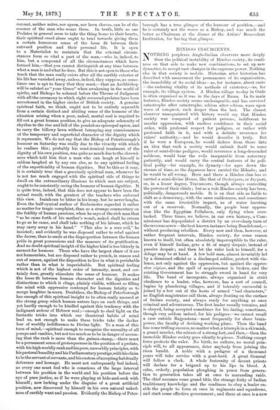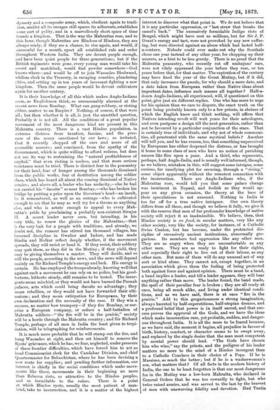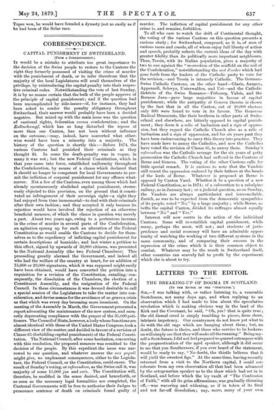HINDOO INSURGENTS.
NOTHING perplexes Anglo-Indian observers more deeply than the political instability of Hindoo society, its readi- ness on that side to make new combinations, to set up new dynasties, to accept vast changes in the supreme power. Nothing else in that society is mobile. Historian after historian has described with amazement the permanence of its organisation, the immobility of its social ideas—as, for instance, about caste —the enduring vitality of its methods of existence,—as, for example, its village system. A Hindoo village to-day in Oude is often organised as it was in the days of Rama. In its main features, Hindoo society seems unchangeable, and has survived catastrophe after catastrophe, schism after schism, wave upon wave of conquest, each deeper than the last. The closest observer unacquainted with history would say that Hindoo society was composed of patient persons, indifferent to secular oppression, with endless confidence in their social order, with profound respect for pedigree, or rather with profound faith in it, and .with a definite reverence for rulers' authority,—and he would describe it truly. But if he were a European, he would deduce from those data an idea that such a society would submit itself to some ruler of semi-divine pedigree, would reverence a long-descended noblesse, would bear the evils inseparable from autocracy patiently, and would carry the central features of its poli- tical polity—for example, its dynasty—for ages down the stream of time, as the Japanese have carried the Mikado ; and he would be all wrong. Here and there a Hindoo clan has so carried a semi-divine House, like that of Oodeypore, or Jevpore, or, in a lesser degree, Travancore, though always contesting the powers of their chiefs ; but as a rule Hindoo society has been, politically, dangerously mobile. It is on that side as liable to shift as a democracy, with the same suddenness, and sometimes with the same irresistible impact, as of water bursting out of a reservoir. Normally, the people bear oppres- sion like the Egyptian Fellaheen, only flying when over- tasked. Three times, we believe, in our own history, a Com- missioner has depopulated a district by an over-sharp turn of the revenue screw—the best known instance being Bundelcund,— without producing rebellion. Every now and then, however, at rather frequent intervals, Hindoo society, for some reason known to itself, but often absolutely imperceptible to the ruler, even if himself Indian, gets a fit of angry despair, instead of passive despair• ; and then let the ruler look to himself, for a deluge may be at hand. A few bold men, almost invariably led by a dismissed official or a discharged soldier, protest with vio- lence, not only against the oppression, but against the oppres- sive regime, and the spell of acquiescence is broken, and the existing Government has to struggle sword in hand for very life. The band of insurgents, always organised in strict obedience to a leader, who, however, has a sort of council, begins by plundering villages, and if tolerably successful is joined by a few out of the hosts of armed " bad characters," as English magistrates call them, always floating on the surface of Indian society, and always ready for anything at once criminal and adventurous. The first leader usually remains, and is obeyed, being accepted sometimes for his daring, sometimes, though very seldom indeed, for his pedigree—we cannot recall a case outside Rajpootana—most frequently for sheer brain- power, the faculty of devising working plans. Then the baud has some trifling success, no matter what, a triumph in a skirmish, a grand murder, the seizure of a strong fort, and then,—then the immobile Hindoo society goes silently to pieces. Nothing except force protects the ruler. No birth, no culture, no moral prin- ciple will, to all appearance, deter anybody from joining the risen bandit. A noble with a pedigree of a thousand years will take service with a goat-herd. A great General will follow a clerk. A whole fraternity of decent priests will declare for a brigand up to his lips in blood. A calm, orderly, population ploughing in peace from genera- tion to generation takes all at once to marauding raids. The chief assumes some grand title, the strange fixity of Indian traditionary knowledge and the readiness to obey a leader en- able the people to form at once in regiments and squadrons, and start some effective government; and there at once is a new
dynasty and a composite army, which, obedient again to tradi- tion, amidst all its ravages still spares its adherents, establishes some sort of polity, and in a marvellously short space of time founds a kingdom. That is the way the Mahrattas rose, and to this hour, though Mahrattas are Hindoos of Hindoos, they are always ready, if they see a chance, to rise again, and would, if
successful for a month, upset all established rule and order throughout Western India. They are decent people enough,
and have been quiet people for three generations; but if the British regiments were gone, every young man would take his sword and matchlock, would find powder somewhere—God -knows where—and would be off to join Wassadeo Bhulwrind, whilom clerk in the Treasury, in ravaging counties, plundering cities, and setting up in ten years of incessant fighting a new kingdom. Then the same people would be devout cultivators again for another century.
It is their knowledge of all this which makes Anglo-Indians seem, as Englishmen think, so unreasonably alarmed at the recent news from Bombay. What can gang-robbery, or rioting either, matter to an Empire P Nothing, of course, if that were all; but then whether it is all, is just the unsettled question. Probably it is not all. All the conditions of a great popular movement of the most dangerous kind are present in this Mahratta country. There is a vast Hindoo population, in
extreme distress from taxation, famine, and the pres- sure of the usury sanctioned by our laws ; so irritated, that it recently chopped off the ears and noses of all accessible usurers ; and convinced, from the apathy of the Government, which is quite willing to afford redress, but does not see its way to restraining the " natural profitableness of capital," that even rioting is useless, and that more serious resistance must be tried. There is distinct fear in the peasantry for their land, fear of hunger among the thousands dismissed from the public works, fear of destitution among the soldier class, which has heard all about the coming dismissal of Native armies; and above all, a leader who has audacity,—else he had not carried his " dacoits " so near Bombay,—who has broken his bridge by putting a price upon the Governor's head—an insult, be it remembered, as well as an outrage—who is cultivated enough to see that he may as well try for a throne as anything else, and who is astute enough to appeal to every Mali- ratta's pride by proclaiming a probably non-existent Sivajee II. A secret leader never seen, but intending, in his very title, to renew the glories of the Mahrattas,—that is the very bait for a people with traditions, and already, we doubt not, the rumour has stirred ten thousand villages, has loosened discipline in Gwalior and Indore, and has made Sindia and Holkar reflect deeply whether, if the movement spreads, they will resist or head it. If they resist, their soldiery may quit them, as they did in the Mutiny ; if they yield, they may be giving themselves a master. They will decide, and so will the people, according to the news, and the news will depend mainly on Sir Richard Temple's energy and luck. His energy is certain. He has employed the troops already, knowing well that against such a movement he can rely on no police, but his good- fortune, hitherto steady, still remains to be tested. The insur- gents mean mischief, or they would not have burned the Poonah palaces, acts which could bring dacoits no advantage ; they mean rebellion, or they would not have forwarded their ulti- matum; and they mean extirpation for Europeans, by their own declaration and the necessity of the case. If they win a success, no matter how trumpery—if they fire Bombay, or sur- prise a European company, or seduce a half-battalion of Mahratta soldiers—" the fire will be in the prairie," society will be a horde through the Mahratta country; and Sir Richard Temple, perhaps of all men in India the least given to trepi- dation, will be telegraphing for reinforcements.
It is much more probable that he will stamp out the fire, and hang Wassadeo at sight, and then set himself to remove the Ryots' grievance, which he has, we fear, neglected, under pressure of these frontier difficulties, which have forced him to act as head Commissariat clerk for the Candahar Division, and chief Quartermaster for Beloochistan, where he has been devising a new route for supplies; and pending further information, our interest is chiefly in the social conditions which make move- ments like these, movements in their beginning no more than Rebecca riots, so attractive to the Hindoo peoples,
and so formidable to the rulers. There is a point at which Hindoo ryots, usually the most patient of man- kind, take to insurrection, and it is a matter of the highest interest to discover what that point is. We do not believe that it is any particular oppression, or " last straw that breaks the camel's back." The excessively formidable Indigo riots of Bengal, which might have cost us millions, but for Sir J. P. Grant's energy and tact, were not provoked by any new suffer- ing, but were directed against an abuse which had lasted half- a-century. Nobody could ever make out why the Sonthals chose one year instead of any other year, for chopping up their usurers, as a hint to be less greedy. There is no proof that the Mahratta peasantry, who recently cut off umhajuns' ears, were not vilely oppressed the year before they rose, or ten years before that, for that matter. The expiration of the century may have fixed the year of the Great Mutiny, but if it did, that only increases the puzzle, for why should a mere date, and a date taken from European rather than Native ideas about important dates, influence such masses all together P Half-a- dozen Anglo-Indians, all experienced, will, if questioned on this point, give just six different replies. One who has more to urge for his opinion than we care to dispute, the exact truth on the point being probably known only to a few priests, in shrines of which the English know and think nothing, will affirm that Natives intending revolt will wait years for their astrologers, and even postpone a design till the next generation, rather than not be favoured by a particular conjunction of the stars. That is certainly tree of individuals, and why not of whole communi- ties, all penetrated with the same mystical beliefs P Another will tell you, and he has reason, too, that something unperceived by Europeans has either deepened the distress, or has brought it home to some class of men who have no notion of perishing unseen like flies upon a pane. And a third, who represents, perhaps, half Anglo-India, and is usually well informed, though, as we believe, mistaken in this, will suggest some intrigue, some curious, far ramifying plot for securing, through a "rising," some object apparently without the remotest connection with the insurrection. There are Anglo-Indians who, if the Mahrattas rose, would tell you that some palace change was imminent in Nepaul, and foolish as they would ap- pear on any given occasion, the theory at the base of their speculations is not unsound. Nothing in India is too far off for a true native intriguer. Our own theory differs from all these, and though we believe it fully, we give it with the reserve that men of far profounder knowledge of native society will reject it as inadmissible. We believe, then, that Hindoo society is au fond, in secular matters, very like any other society, very like the society, for instance, of a Catholic Swiss Canton, but has become, under the protracted dis- cipline of excessively ancient institutions, abnormally gre- garious. Its members feel oppression like any other men. They are as angry when they are uncomfortable as any other men. They are as ready to fight for their rights, and especially their right to live out of their labour, as any other men. But none of them will do any unusual act of any sort or kind alone. They cannot act, except together, in an association which gives them the feeling of being protected both against force and against opinion. There must be a band, a band implies a leader, and till a leader appears, they will bear anything rather than move. The leader found, the band made, the spell of their peculiar fear is broken ; they are all ready at once, being all much alike, and living under identical condi- tions, and as we have said, there is at once " fire in the prairie." Add to this gregariousness a strong imagination, always haunted by half-superstitious, half-utopian dreams, and a profound belief that power is in itself sacred, and that suc- cess proves the approval of the Gods, and we have the ideas which make insurrection rare, yet probable, sudden, and danger- ous throughout India. It is all the more to be feared because, as we have said, the moment it begins, all prejudice in favour of birth, history, conduct, or character seems to be swept away, and replaced by the single desire that the man most competent by mental power should lead. "The Gods have chosen him who wins," say the priests, and the pedigree of his leader matters no more to the mind of a Hindoo insurgent than to a Catholic Conclave in their choice of a Pope. If he is Massimo, so much the better; but if he is a washerwoman's son, what matters that P Of all facts in the modern history of India, the one to be least forgotten is that our most dangerous foe in the Mutiny was a low-born Mahratta, who declared in General Orders that he was too cowardly to fight, but who twice raised armies, and was served to the last by the bravest of men with unswerving fidelity and devotion. Had Tantia
Topee won, he would have founded a dynasty just as easily as if he had been of the Solar race.




































 Previous page
Previous page